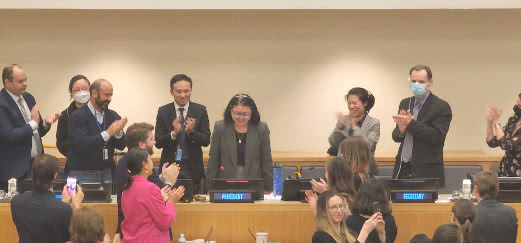
The Federation of the Sea, which represents the maritime cluster Italian, joined the general appreciation for the Successful conclusion of negotiations for the achievement of the new United Nations High Seas Treaty to Protect the Ocean, tackling environmental degradation, fighting change climate and prevent biodiversity loss. Saturday indeed, the Intergovernmental Conference on Biodiversity marinas of areas outside national jurisdiction (BBNJ), chaired by Rena Lee, Ambassador of Singapore for Matters on the oceans and the law of the sea and special envoy of the Minister for Foreign Affairs, successfully concluded negotiations on a new international agreement under the Convention of the United Nations on the Law of the Sea (UNCLOS) on conservation and the sustainable use of marine biodiversity in areas beyond outside national jurisdiction.
Singapore has chaired BBNJ negotiations since September 2018 and Saturday was the culmination of the discussions launched in 2004 under the auspices of the UN to improve the International legal on storage and use sustainable biological diversity in the oceans beyond exclusive economic zones and continental shelves States.
The Federation of the Sea recalled that, despite being extremely biodiverse, only 1% of the high seas is currently regulated and highlighted that the BBNJ agreement is So an important step forward in contributing to governance of the global commons. 'The success of the Intergovernmental Conference of the BBNJ - noted the president of the Federation of the Sea, Mario Mattioli - reaffirms the importance and the relevance of multilateral and national cooperation United in establishing and sustaining an international order based on Rules. It is a historic moment event because after Over a decade of preparatory work and international negotiations the agreement on the United Nations High Seas Treaty represents a concrete step forward for the protection of oceans and to preserve marine life and biodiversity, indispensable resources for present and future generations".
An innovative aspect of the BBNJ agreement involves the commitment of the Developed countries to provide an additional 50% of their contributions annual financial under the agreement to finance capacity-building that will help developing countries development to conserve and sustainably use the marine biodiversity, as well as to implement the agreement. The BBNJ agreement also commits states to share the benefits arising from the use of marine genetic resources, including by facilitating access to samples and data from scientific research on Marine organisms from areas outside the jurisdiction national researchers from developed and developing countries.
The Agreement will enter into force after ratification by 60 States. Meanwhile, the EU has already expressed its commitment to ensure that this happens quickly and, to help countries developing to prepare for its implementation, will allocate EUR 40 million under a Global Programme for oceans inviting members of the High Ambition Coalition to do the same within the limits of their capabilities. (High Ambition Coalition is an informal group of countries within the United Nations Framework Convention on Climate Change committed to pushing forward progressive proposals on ambition climatic).
